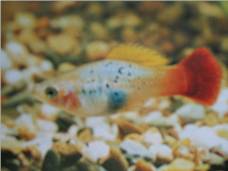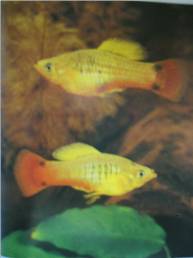Platy
Genus name: Xiphophorus (species)
Distribution: Southern Mexico, Guatemala, Honduras
Length: males up to 2.2″ (5.5cm), females up to 2.8″ (7cm)
Minimum Tank Length: 12″ (30cm)
Water Temperature: 68-75F (20-24C)
Diet: Worms, crustaceans, insects, dried food, plant matter
Water: medium-hard and slightly alkaline
Breeding: Livebearers
The original Platy (Xiphophorus Maculatus), and the Variatus Platy (Xiphophorus Variatus) have been interbred for many years, so the varieties generally available for sale are not true purebreds of the species. There are thought to be at least 40 different hybrids and selected forms of Platys around, including the popular Red, Sunset and Tuxedo varieties.
Platys like to live in an aquarium with some areas of dense vegetation, along with areas of open water for swimming.
The male and female Platys are easy to distinguish from each other, as the male is smaller, and has a gonopodium (a modified anal fin).
Like most livebearers, Platys are very easy to breed, and for that reason are ideal for beginners. Keeping at least 2-3 females for each male will help ensure the female Platys aren’t harassed too much.
When breeding
To ensure the best survival rate, it is best to remove the female Platy from the main aquarium and move her to a nursery aquarium before she gives birth. A few young Platys may survive in a community tank if there are sufficient plants for them to hide in, but generally most of them will get eaten, either by their parents or the other occupants of the aquarium.

